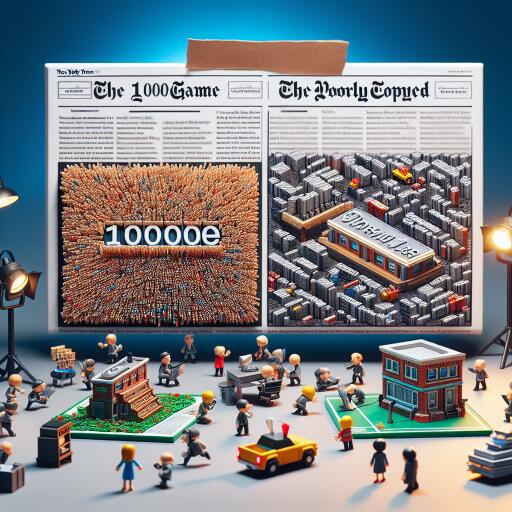New York Times Celebrates Milestone 1,000th Edition of Popular Word Puzzle Wordle
On a momentous Friday, the New York Times celebrated the release of the 1,000th edition of Wordle, the captivating internet-based word challenge that has seized the attention of word aficionados globally since its rise to fame in October 2021. Acquired from Brooklyn’s own software engineer, Josh Wardle, in early 2022 for an undisclosed amount rumored to be in the low-seven figures, Wordle’s simple yet engrossing gameplay has firmly established it as a daily mental exercise for millions.
Wordle invites players to deduce a secret five-letter word within six attempts, fostering a communal spirit among language enthusiasts who eagerly partake in this ritualistic puzzle-solving. Despite its purchase, the New York Times has assured fans that Wordle will remain free to play, maintaining its widespread appeal.
However, the journey has not been without its challenges for the Times. In an effort to protect the integrity of Wordle, the company has actively combated against imitations of the game. Leveraging copyright claims, the Times has targeted several creators of similar puzzles, enlisting the aid of the developer platform GitHub to deter copycats from proliferating. GitHub, upholding a policy of thorough review for Digital Millennium Copyright Act (DMCA) takedown requests, collaborates by informing its users of potential copyright violations, allowing them the chance to modify or remove infringing content.
The stance of the New York Times is clear: while it does not oppose the creation of comparable word games per se, it draws the line at direct replicas that infringe upon its copyrighted material. This policy led the Times to act against an individual who not only devised a “Wordle clone” on GitHub but also shared instructions for replicating their version of the game, alongside others who disseminated the same infringing code.
Wordle’s allure is not just in its gameplay but also in the social interactions it fosters. Eric Akaoka, a Toronto-based product designer, reflects on the game’s significance during the pandemic. For him and his group chat buddies, Wordle represented a beacon of connection in isolation, offering a comforting routine amidst the upheaval. Boasting a commendable win streak and a near-perfect win rate over hundreds of games, Akaoka shares how Wordle served as a welcomed diversion, reinforcing bonds through a shared, low-stakes challenge.
The unique draw of Wordle lies in its consistent format and the daily anticipation it builds. Players cherish the familiarity and the communal bragging rights that come from solving the puzzles. The game’s viral spread was further fueled by a feature that enabled the sharing of results in a visually engaging manner, using emojis and color-coded blocks, fostering a broader sense of community among players or “Wordlers”.
However, the road to protecting Wordle’s originality is paved with complexities. Utilizing DMCA notices, the New York Times seeks to safeguard its intellectual property, a move that can lead to the removal of infringing content though not without potential legal battles for those who choose to dispute the claims. This enforcement strategy recently saw the disappearance of a German-language spinoff, hinting at the global reach of the Times’s protective measures.
As Wordle continues to unite players across the globe with its simplistic charm and intellectual allure, the New York Times remains vigilant, ensuring that the game’s original integrity is preserved for the millions who have made it a cherished part of their daily routine.









